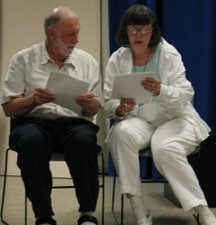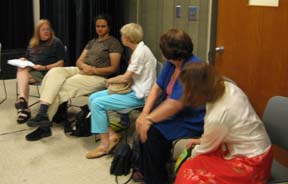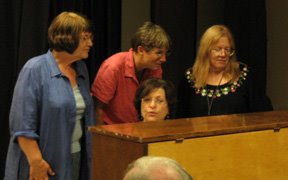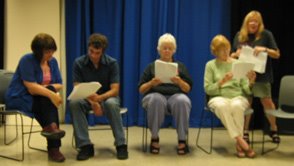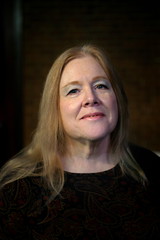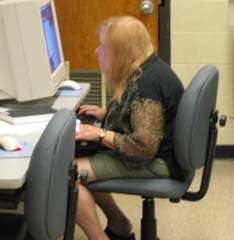
Alan sent out an email re: Monday night's readings: "
of work done today by Vicki Cheatwood, Mrinalini Kamath, and some previous work prepartory to work Margaret McSeveney would have written today if she hadn't had to spend much of the day trekking about getting documents in place! Volunteer performers on hand were terrific. Carolyn Gage joined us a bit late, since she sat in on a rehearsal of 'Til the Fat Lady Sings, to be read on Saturday night. Geralyn Horton, Farzana Moon and Diane Rao also here, already writing or getting ready to! We're in full swing....."Tuesday morning I got up, dressed, went to the Computer Lab and, with no "block" at all, sat down and began turning my notes for the play about Susanna Centlivre into speeches and scenes. Got a salad from the Drake complex's student deli, continued writing till 4pm when there was a panel on Columbus Theatre.
Here are my notes from the panel:
8/15: Panel on straight and GLBT theatre in Columbus, third Columbus National Gay and Lesbian Theatre Festival in Columbus, September, 2006; Jon Putnam, ; , Director, Puppet Queers; , performer; Lori Cannon,
Upcoming: G&LBT Festival, Actors' theatre AD, does Shakes in the park.
Catco: -- John Putman Associate Artistic Director, CATCO
does shorts fest of 8-10 min plays based on a setting. 120 submissions last year: winners were mostly writers known to the company, including some fairly well known writers. Re-writes done during rehearsal, writers need to be present at some point. Last new mainstage play was last fall, 2 years' work on that. The lit. dept is buried in MS. The last produced script came with money to help support development and production-- there was important local support for the subject matter, as well as key local people who believed in the writer's script. It did very well.
MadLabs: now gone.Did well when it had a liquor license and also could clear the set have have a band play afterwords. Drew a non-theatre crowd with lively local referenced stuff; exhausted the talent who had to do everything on a killer schedule to keep it happening.
Dee Shepherd , co-founder, Reality Theatre; Chris Brooks, performer. Reality Theatre: created own plays through improv. If a play happened to be perfect, they'd do it. Also, crazy shows like one that was simply an out loud reading of grant proposals.
New Venture: did some old, some new.
Got a lot of submisions, had to reject any with large cast or difficult staging.
Beth Kattelman: Puppet Queers: dirty songs & stories; mostly just fun, although political.
Lori Cannon: performer/standup/writer. Equity actress- worked in ensemble 8 plays a year until she got her Equity card. Hasn't worked since-- now does things like a 24 hour play production.
Columbus Arts papers have gone under, other papers have reduced coverage.
Corporate funding doesn't want to be associated with controversial material.
Small businesses is more supportive: will take out ads and donate in-kind stuff.
Suggestions for writers: write with a theme on a project for a community.
write industrial shows: people who need industrials are not swamped by writers.
New works do really look good on a grant proposal. If you can find an instution that gives grants, you can work through a theatre to put up work that qualifies for funding.
Local writer Brian Clark moved to Hawaii & was commissioned to write a whole series of plays based on Hawaiian history.
Bathhouse Cultural Center has been successful with a Festival of Independent Theatres: each gets a one hour slot, within which a show must get in, play, and get out. Now there's a second event, the Out of the Loop Festival.
Columbus Center hosts community theatre on a rotating schedule.
Then out to the Mall for dinner: probably a feast, certainly lots of good talk!
Tuesday night we had readings, including 20 minutes of what I've written on my new play. People were only mildly confused, and some of the jokes got laughs! I consider this very encouraging.
